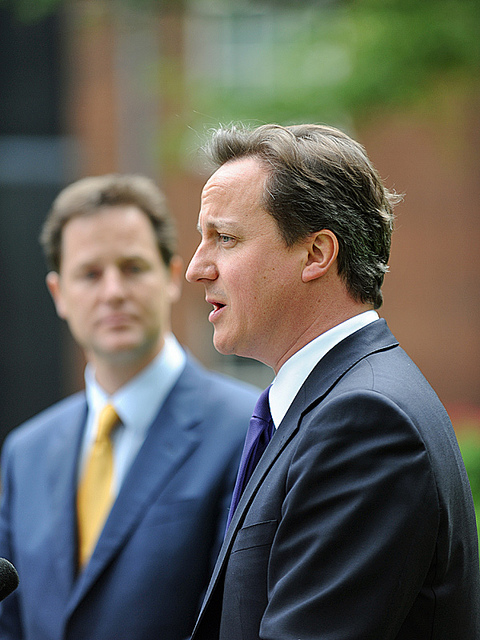
U.K. Prime Minister David Cameron (right) and Deputy Prime Minister Nick Clegg (left) disagree on many issues, including the idea that Britain is and should be a Christian country.
Is Britain a Christian country?
Legally? Yes. Culturally? ish. Demographically? Increasingly less so.
Does it matter? Heavens yes! Hell no!
Not surprisingly, the country’s leading politicians and pundits are divided.
Britain’s religious identity has been hotly debated for centuries, even before Henry VIII split with Rome to become head of the Church of England in 1534. The debate, which has obviously evolved over the centuries, was rekindled earlier this month at Prime Minister David Cameron’s Easter reception. Cameron told a roomful of prominent Christians:
And as Eric Pickles said this week, we should be proud of the fact that we are a Christian country, and I am proud of the fact we’re a Christian country and we shouldn’t be ashamed to say so.
But those weren’t Communities Secretary Eric Pickles’ only remarks on the matter. Speaking to delegates at the Conservative spring Forum in London, he said of “militant atheists”:
We’re a Christian nation. We have an established church. Get over it. And don’t impose your politically correct intolerance on others.
Not so nice, but he’s partially correct. The Church of England is the officially established Christian church in England. The Queen is head of state, but she’s also Defender of the Faith and Supreme Governor of the church. 26 seats in the House of Lords are reserved for church officials, and state-funded schools can refuse to admit children based on their parents’ faiths.
Work and Pensions Secretary Iain Duncan Smith said those who deny Britain is a Christian country are “absurd” and “ignoring both historical and constitutional reality.”
Again, a little harsh, but fair point from a historical and legal perspective.
Here’s where things get dicey. Amid backlash for his comments about this “Christian country,” Cameron doubled down on Jesus and upped his evangelical rhetoric in a column for the Anglican newspaper Church Times.
I believe we should be more confident about our status as a Christian country, more ambitious about expanding the role of faith-based organisations, and, frankly, more evangelical about a faith that compels us to get out there and make a difference to people’s lives.
Cameron represents Britain’s supposed “Defender of the Faith,” but he also represents the voting public. To say “we” (Britain) should be more evangelical about a faith (Christianity) that compels “us” disenfranchises the 41 percent of people in England who do not identify as Christian. A study conducted last year suggests that half of Brits are non-religious and only 20 percent belong to the Church of England.
If anyone has a stake in claiming Britain as a Christian country it’s Archbishop of Canterbury Justin Welby, the church’s principal leader. His remarks on the matter have been somewhat measured:
It is a historical fact (perhaps unwelcome to some, but true) that our main systems of ethics, the way we do law and justice, the values of society, how we decide what is fair, the protection of the poor, and most of the way we look at society . . . All have been shaped by and founded on Christianity.
Despite Christian foundations, only 1.5 percent of residents in England regularly attend Sunday service. In these terms, Britain “is certainly not” a Christians country, Welby added.
55 of the nation’s leading secularists responded to Cameron’s remarks in an open letter this week:
Apart from in the narrow constitutional sense that we continue to have an established Church, Britain is not a “Christian country” … We are a plural society with citizens with a range of perspectives, and we are a largely non-religious society. Constantly to claim otherwise fosters alienation and division in our society.
I live in Whitechapel, one of London’s most ethnically and religiously diverse pockets. Once the East End’s Jewish hub, Whitechapel is now predominantly Muslim. Halal butcher shops and colorful sari stalls line the streets and remain open on Christmas when most of the city has shut down. Is Whitechapel not part of Cameron’s Christian Britain?
Deputy Prime Minister Nick Clegg waded into the debate Thursday, calling for the Church of England’s disestablishment in England (i.e. separation of church and state):
In the long run it would be better for the church and better for people of faith, and better for Anglicans, if the church and the state were over time to stand on their own two separate feet.
From a religious freedom perspective, I couldn’t agree more.





